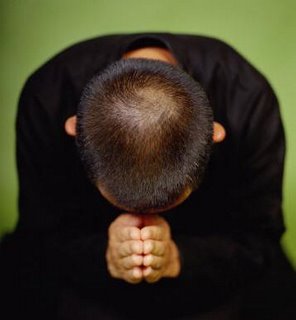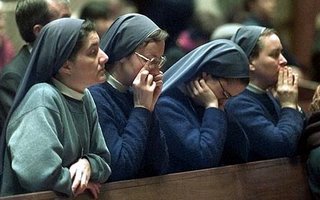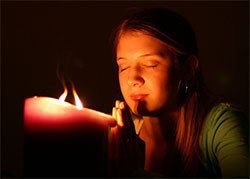 This afternoon I receive a phone call from John, a ministerial colleague from the local Baptist church. He has some kind words of encouragement for me, and lets me know he’s been mentioning my name weekly in his worship services, as one of their prayer concerns. I’ve heard something similar from friends who attend the local Roman Catholic church, and am aware there are other churches who have been praying for me, as well – both locally and in some far-off places. I couldn’t begin to guess how many prayer chains, prayer lists and such I must be on.
This afternoon I receive a phone call from John, a ministerial colleague from the local Baptist church. He has some kind words of encouragement for me, and lets me know he’s been mentioning my name weekly in his worship services, as one of their prayer concerns. I’ve heard something similar from friends who attend the local Roman Catholic church, and am aware there are other churches who have been praying for me, as well – both locally and in some far-off places. I couldn’t begin to guess how many prayer chains, prayer lists and such I must be on.I suppose that, when pastors get sick, their names tend to float to the top of lists of this sort. It’s not that we’re any more worthy of prayers than other people; it’s just that, shall we say, there’s a certain notoriety that goes along with the position.
 There’s been a lot of discussion in the media, in recent weeks, about intercessory prayer – stirred up by a multi-million-dollar research project conducted by Dr. Herbert Benson, one of the pioneers of “complementary medicine” – that movement that wants to combine hard-science-based medical treatments with softer practices like prayer and meditation. Benson is a Harvard-trained cardiologist, author of the 1975 bestseller, The Relaxation Response, and director of the Mind/Body Medical Institute. He’s made some very interesting contributions to this whole discussion over the years.
There’s been a lot of discussion in the media, in recent weeks, about intercessory prayer – stirred up by a multi-million-dollar research project conducted by Dr. Herbert Benson, one of the pioneers of “complementary medicine” – that movement that wants to combine hard-science-based medical treatments with softer practices like prayer and meditation. Benson is a Harvard-trained cardiologist, author of the 1975 bestseller, The Relaxation Response, and director of the Mind/Body Medical Institute. He’s made some very interesting contributions to this whole discussion over the years.After some earlier studies that suggested there could be a scientifically-measurable outcome to intercessory prayer, Benson organized a much larger research project, and ran it according to rigorous scientific method. It included both “blind” and “non-blind” aspects: some sick people (heart-bypass patients) were told they were going to be the object of intercessory prayers, while others were not. Benson enlisted some serious pray-ers to do the work: cloistered nuns and others who could be expected to be meticulous about following through.
 When everything was said and done, the study revealed that intercessory prayer had no scientifically-measurable impact on the health of those who were being prayed for (in fact, those who were aware they were being prayed for seemed to do slightly worse than the control group who had no idea).
When everything was said and done, the study revealed that intercessory prayer had no scientifically-measurable impact on the health of those who were being prayed for (in fact, those who were aware they were being prayed for seemed to do slightly worse than the control group who had no idea).I could have predicted the same. For all that people like Dr. Benson may wish it weren’t so, prayer just isn’t something that lends itself to scientific measurement and study. Do we really pray for utilitarian reasons, to obtain a certain, specific outcome – as, for example, when we swallow a pill prescribed for us by our doctor?
What if Benson’s study had revealed improved health for, say, five percent of those who were being prayed for? That would have been statistically significant, making headlines around the world and boosting the cause of intercessory prayer to no end. But that would have begged another, larger question: why only five percent? Why not ten? Or twenty? Would such numbers mean that God can be influenced only to a certain degree, and no more? What if the researchers had doubled the number of praying nuns – would it have doubled the positive outcome? And what about that group of heart-bypass patients in the hospital across town, whose names weren’t given to the nuns to pray for? Would such results mean God cares about those patients less?
 Other, weirder questions would come up. If there had, indeed, been a measurable positive outcome, then maybe Blue Cross/Blue Shield would have to start funding monastic communities of monks and nuns – but how would they then determine which prayer practitioners were best-qualified to do the work? What sort of licensing or certification would they have to have? And how much praying would the insurance companies be willing to cover, as a “usual, customary and reasonable” expense?
Other, weirder questions would come up. If there had, indeed, been a measurable positive outcome, then maybe Blue Cross/Blue Shield would have to start funding monastic communities of monks and nuns – but how would they then determine which prayer practitioners were best-qualified to do the work? What sort of licensing or certification would they have to have? And how much praying would the insurance companies be willing to cover, as a “usual, customary and reasonable” expense?I’m glad the Benson study came out as inconclusive as it did. I’m not sure we’d want to face the tricky theological and ethical questions a positive result would have raised!
 As for the intercessory prayers, I’ll receive them gratefully, from any and all sources. Thanks, John – and so many others – for mentioning me so faithfully, Sunday after Sunday. Healing is ultimately a mystery, as is faith itself. In prayer, we reach out and touch the mystery – and, we trust, God touches us back, somehow, in ways our minds can’t begin to comprehend.
As for the intercessory prayers, I’ll receive them gratefully, from any and all sources. Thanks, John – and so many others – for mentioning me so faithfully, Sunday after Sunday. Healing is ultimately a mystery, as is faith itself. In prayer, we reach out and touch the mystery – and, we trust, God touches us back, somehow, in ways our minds can’t begin to comprehend.